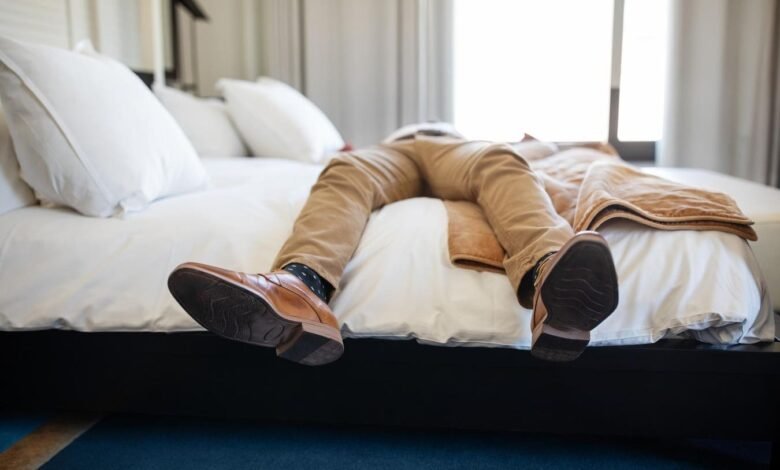How travel affects sleep and what to do about it

Travel can affect sleep on several levels.
Traveling can take us to exciting new places, offering a break from the daily grind and an opportunity to enjoy new experiences. However, amidst the excitement, there’s a companion we often have trouble keeping up with: our sleep. Whether you’re traveling across continents or just spending a night away from home, the quality of your sleep can significantly impact your trip. Rebecca Robbins, MMSc, PhD, MS, member of the Equinox Health Advisory Board, shares her expertise on how sleep is affected by travel and what the emerging sleep tourism trend means for travelers.
Why can’t you sleep when traveling
When we travel, our sleep is often one of the first things to suffer and the reasons are multifaceted. Dr. Rebecca Robbins, a member of the Equinox Health Advisory Board, investigates the complex interplay of biological, psychological and environmental factors that disrupt our sleep during travel.
A significant disruptor is the “first night effect,” in which our brains remain partially alert due to inherent survival mechanisms, preventing us from entering the deeper, more restorative phases of sleep. This heightened state of alert is an evolutionary trait that has historically helped protect us from potential dangers in unfamiliar environments. As a result, travelers often experience lighter sleep and more frequent awakenings during their first night in a new place.
The sensory changes in a new environment can further disrupt our sleep. Unknown noises – whether from street traffic, hotel air conditioning units or even different patterns of silence – together with unusual lighting can alter our circadian rhythm, the internal clock that regulates our sleep-wake cycle. This disruption makes it difficult to fall asleep and stay deep sleep.
Adding to these challenges are the physical and psychological stresses of travel. Long periods of sitting, whether on a plane or in a car, can cause physical discomfort and stiffness, while the dry air in plane cabins often causes dehydration, contributing to discomfort that can keep us awake. Additionally, the stress of navigating new places, managing travel schedules, and anticipation or anxiety about travel events can build up, significantly impeding our ability to relax at bedtime.
Jet lag resulting from crossing time zones exacerbates these problems by desynchronizing our biological clock, making it difficult to fall asleep and wake up at socially appropriate times. Depending on the number of time zones crossed, adjusting to local time may be a slow process, further prolonging sleep disturbances.
Understanding these factors allows travelers to better prepare for and manage sleep disorders while traveling. Practical measures such as staying hydrated, engaging in relaxing activities before bed, and gradually adjusting your sleep schedule before traveling can help mitigate these effects, improving the overall travel experience by ensuring you get better rest.
The emergence of sleep tourism
The importance of sleep is gaining recognition, leading to an increase in sleep tourism. This trend includes improved sleep-focused amenities in hotels and the creation of sleep retreats. “Hotels are starting to realize they’re not just selling a room; are selling a good night’s sleep,” says Dr. Robbins. Sleep retreats are another aspect of this trend, offering programs that educate about the science of sleep and provide tools for better sleep, often in serene environments perfect for relaxing.
Equinox Hotels takes the concept of sleep tourism to new heights with its sleep-centric amenities. Designed to anticipate the needs of each guest, its rooms and suites are perfect for various activities, from celebrations to work and especially sleeping. Equinox also presented its Global Sleep Symposium, scheduled for June 19-20, which will bring together experts to discuss the transformative power of sleep. This symposium is part of its commitment to redefine sleep tourism through dynamic programming and cutting-edge research.
The Business Case for Better Sleep in Hotels
Improving guests’ sleep quality isn’t just about comfort – it’s smart business. Dr. Robbins points out, “Only a third of travelers are satisfied with their sleep while traveling, indicating a significant area for improvement.” Hotels that invest in better sleep experiences receive more repeat guests and recommendations, which can significantly affect their bottom line.
To help hotels improve their guests’ sleep experiences, Dr. Robbins suggests several practical measures. Ensuring that rooms can be completely darkened, reducing noise and maintaining a cool room temperature are key factors. She also highlights the importance of investing in quality mattresses, pillows and bedding.
Tips for travelers to ensure a good night’s sleep
Robbins provides a robust set of tips for travelers looking to improve their sleep while traveling:
- Maintain a sleep ritual: Maintain a consistent bedtime routine, similar to the one at home, to signal to your brain that it’s time to sleep.
- Adjust your schedule in advance: Gradually change your sleep schedule before traveling across time zones to minimize jet lag.
- Seek natural light: When you arrive, expose yourself to plenty of natural light to help reset your internal clock.
- Choose the right meals: Opt for lighter dinners and enjoy a substantial lunch to avoid sleep disturbances due to heavy evening meals.
- Create a sleep-friendly environment: Use earplugs and eye masks to block out unwanted noise and light, especially in unfamiliar environments.
Understanding how travel affects sleep is crucial to making the most of our adventures. By prioritizing sleep, travelers can better enjoy their trips and the hotel industry can better meet their needs, ensuring every trip is as invigorating as intended. Whether you’re exploring a new city or retreating to a peaceful getaway, remember that a good night’s sleep is your passport to a successful trip.




